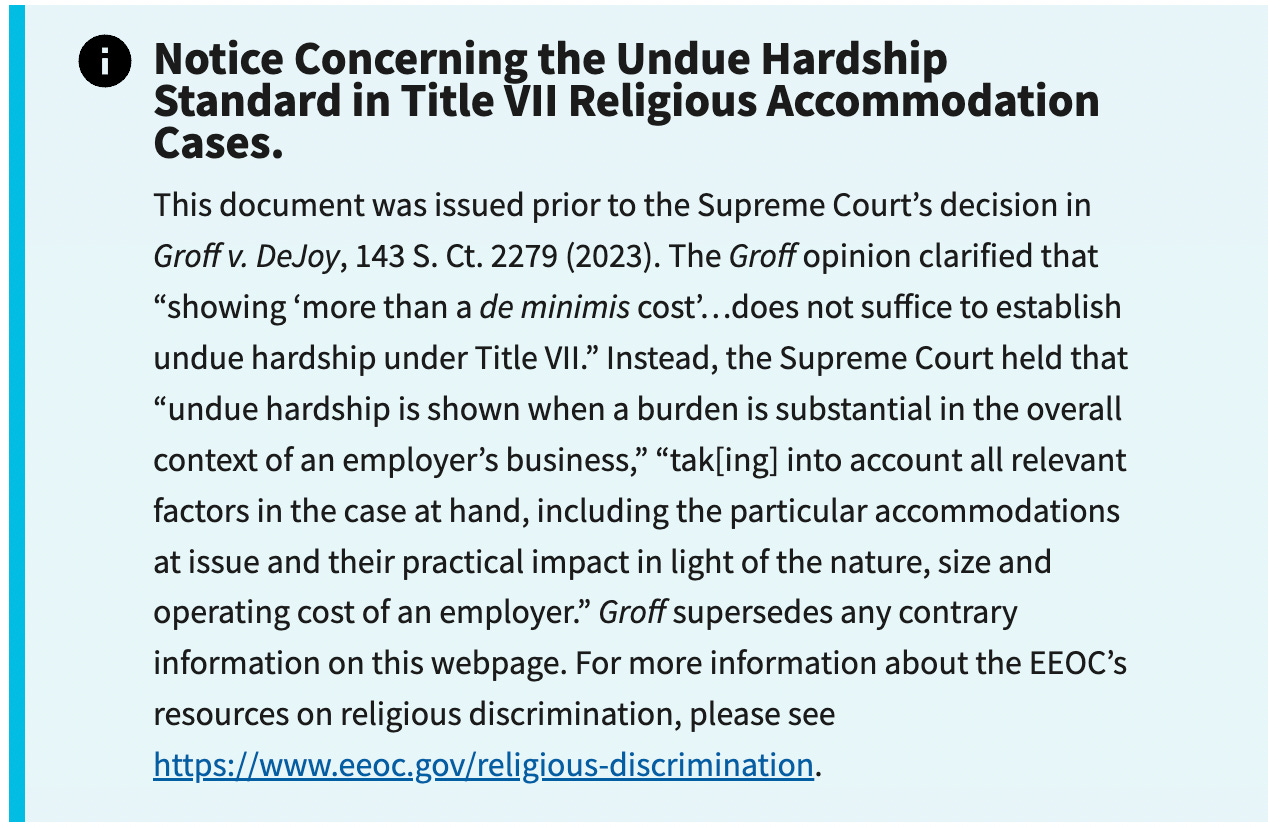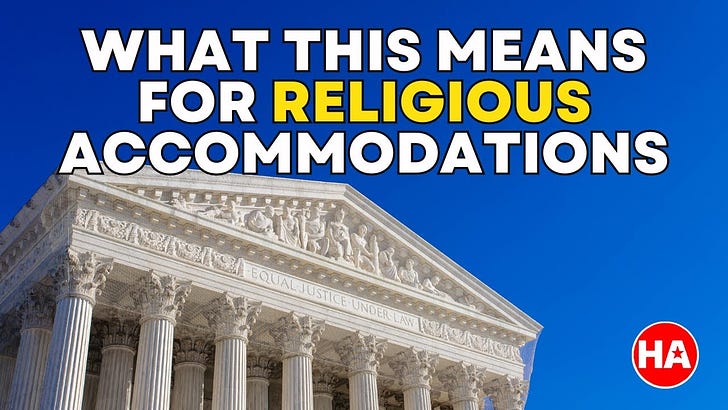Are you looking for education about your religious rights in the workplace? Are you confused about Title VII of the US Civil Rights Act and how it protects you from employment discrimination?
Welcome on board. This article will dissect Title VII of the United States Civil Rights Act, the most powerful anti-discrimination law governing the workplace. It originally prohibited discrimination based on race, gender, religious beliefs, or national origin, and it established the Equal Employment Opportunity Commission (EEOC) as the federal enforcement agency to implement these legal standards.
(Of course, here’s my legal disclaimer: The information provided in this substack is for general informational purposes only and should not be construed as legal advice. Please consult with legal professionals for advice tailored to your individual situation.)
Most of the laws that broadly protect employees from discrimination in the workplace have been enacted through the years as amendments to the Civil Rights Act, also known as Title VII (42 U.S.C. § 2000e et seq.).
No state, no health department, nor any individual or employer covered under Title VII has the authority to violate this federal law.
Title VII of the Civil Rights Act, as amended, protects employees and job applicants* from employment discrimination based on race, color, religion, sex and national origin (all of which are protected classes).
Regarding religion, an employee has the right to his/her own religious beliefs as well as the right to exercise and observe those beliefs without interference from any boss, coworker, supervisor, or any corporate policy or protocol.
Title VII is very straightforward
UNLAWFUL EMPLOYMENT PRACTICES
SEC. 2000e-2. [Section 703]
(a) Employer practices
It shall be an unlawful employment practice for an employer -
(1) to fail or refuse to hire or to discharge any individual, or otherwise to discriminate against any individual with respect to his compensation, terms, conditions, or privileges of employment, because of such individual's race, color, religion, sex, or national origin; or
(2) to limit, segregate, or classify his employees or applicants for employment in any way which would deprive or tend to deprive any individual of employment opportunities or otherwise adversely affect his status as an employee, because of such individual's race, color, religion, sex, or national origin.
To summarize, the law forbids discrimination when it comes to any aspect of employment, including hiring, firing, pay, job assignments, promotions, layoff, training, fringe benefits, and any other term or condition of employment. There is one exception (the undue hardship defense) which will be discussed in more detail below.
Title VII also prohibits workplace segregation based on religion (including religious garb and grooming practices), such as assigning an employee to a non-customer contact position because of actual or feared customer preference.
No one can be coerced, harassed, influenced, intimidated, or forced to do something that is in conflict with their sincerely held religious beliefs or that would otherwise force them to abandon or alter their religious beliefs. This is prohibited by law. Period.
There is a common misconception that an at-will employment agreement means that an employer can fire an employee for any reason, without cause. The concept of "at-will employment" holds that employers have the right to terminate an employee's employment for any reason, with the exception of illegal reasons such as discrimination, which is addressed by Title VII of the Civil Rights Act.
Who is covered?
Title VII applies to all private-sector employers (companies and labor unions) with 15 or more employees. It also governs employment agencies, state, and local governments, and apprenticeship programs.
Title VII also protects federal government employees from discrimination, but special procedures have been established to enforce anti-discrimination laws for them.
Federal employees and applicants have a different complaint process from other employees. Federal government employees may file claims of discrimination under the 29 C.F.R. Part 1614 EEO process on any of the bases covered under the laws EEOC enforces, and/or may also utilize additional complaint procedures.
Title VII does not cover independent contractors.
What is the EEOC Compliance Manual on Religious Discrimination?
When it comes to accepting, investigating, determining, and mediating employment religious discrimination claims under the law, the EEOC Compliance Manual is the primary source of EEOC instruction. It provides clarity to the public regarding existing requirements under the law.
EEOC Overview of Section 12, RELIGIOUS DISCRIMINATION click here
The law is clear, and the EEOC explains exactly what is required of employees and employers:
Title VII requires an employer, once on notice, to reasonably accommodate an employee whose sincerely held religious belief, practice, or observance conflicts with a work requirement, unless providing the accommodation would create an undue hardship.
“Title VII requires otherwise-neutral policies to give way to the need for an accommodation.”[205] An individual alleging the denial of a religious accommodation is generally seeking an adjustment to a neutral work rule that infringes on the employee’s ability to practice his religion.[206] “The accommodation requirement is ‘plainly intended to relieve individuals of the burden of choosing between their jobs and their religious convictions, where such relief will not unduly burden others.’”[207]
*Important note concerning the undue hardship standard in Title VII Religious Accommodation Cases:
The EEOC guidance has not been completely updated to reflect the landmark Supreme Court decision in Groff v. DeJoy, 143 S. Ct. 2279 (2023). The notice on the EEOC website reads: The Groff opinion clarified that “showing ‘more than a de minimis cost’…does not suffice to establish undue hardship under Title VII.” Instead, the Supreme Court held that “undue hardship is shown when a burden is substantial in the overall context of an employer’s business,” “taking into account all relevant factors in the case at hand, including the particular accommodations at issue and their practical impact in light of the nature, size and operating cost of an employer.” Groff supersedes any contrary information on this webpage.
To put it simply, this landmark decision ruled that the employer MUST accommodate an employee’s sincerely-held religious beliefs, practice and observance — unless the employer can DEMONSTRATE actual economic hardship that substantially impacts the conduct of business. Previously, the bar had been set pretty low with the "de minimis cost" standard. NOW, by raising the bar for all entities covered by Title VII, the Supreme Court has made it MORE difficult for the employer to claim and establish an undue hardship.
Interested in learning more about the significance of this ruling?
Link below↓
Click HERE if you are being discriminated against by your employer. We can coach you through the process of defending your rights without putting your job in jeopardy.
What is religion under Title VII?
"Title VII defines “religion” to include “all aspects of religious observance and practice as well as belief,” not just practices that are mandated or prohibited by a tenet of the individual’s faith. Religion includes not only traditional, organized religions such as Christianity, Judaism, Islam, Hinduism, Sikhism, and Buddhism, but also religious beliefs that are new, uncommon, not part of a formal church or sect, only subscribed to by a small number of people, or that seem illogical or unreasonable to others. Further, a person’s religious beliefs “need not be confined in either source or content to traditional or parochial concepts of religion.” A belief is “religious” for Title VII purposes if it is “religious” in the person’s “own scheme of things,” i.e., it is a “sincere and meaningful” belief that “occupies a place in the life of its possessor parallel to that filled by . . . God.”[21] The Supreme Court has made it clear that it is not a court’s role to determine the reasonableness of an individual’s religious beliefs, and that “religious beliefs need not be acceptable, logical, consistent, or comprehensible to others in order to merit First Amendment protection.”[22] An employee’s belief, observance, or practice can be “religious” under Title VII even if the employee is affiliated with a religious group that does not espouse or recognize that individual’s belief, observance, or practice, or if few – or no – other people adhere to it.[23]
To summarize, an employee does not have to belong to any recognized faith. They do not have to be a member of any particular church nor is there anything in the law that requires an employer to have something in writing from a religious leader.
With all of this information in mind…
HERE’S A LIST OF WHAT YOU NEED TO KNOW ABOUT YOUR RELIGIOUS RIGHTS ON THE JOB
Keep reading with a 7-day free trial
Subscribe to The Healthy American, Peggy Hall to keep reading this post and get 7 days of free access to the full post archives.






